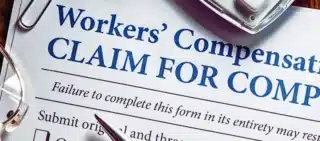
At Strong Law Offices, we have a team of workers' compensation lawyers who understand the financial setbacks and physical limitations...


Can I receive wage replacement benefits if I return to work with limitations? You may have this question after receiving a workplace injury. The Illinois Workers’ Compensation Act allows you to keep receiving wage replacement benefits if you return to light-duty work and your income is lower than what you earned before your injury. Your wage replacement benefits will be two-thirds of the difference between your average weekly earnings before the injury and your current average weekly earnings.
Contact Strong Law Offices at (309) 393-2928 if you need assistance receiving wage replacement benefits.

Wage replacement benefits are vital in Illinois workers’ compensation. They cover lost wages during recovery and may provide Long-term disability benefits, depending on the injury's severity. The primary types of these benefits include:
If you are temporarily unable to work due to an injury, you have the right to receive TTD benefits. These benefits are determined as two-thirds of your average weekly earnings, within the state's minimum and maximum limits. TTD benefits will continue until you can return to work or until you reach maximum medical improvement (MMI), when your condition has stabilized and is not expected to improve with further treatment.
You may qualify for TPD benefits if you can return to work at a lower capacity or wage because of your injury while you recover. These benefits provide two-thirds of the difference between your current earnings and your average weekly wage before the injury. This support helps you financially as you work towards returning to full capacity.
If you suffer injuries that lead to permanent impairment but still allow you to work, you may be eligible for Permanent Partial Disability (PPD) benefits. These benefits depend on the extent of the impairment and are determined using a state-provided schedule. This schedule assigns compensation weeks for different body parts and injury types. The goal of PPD benefits is to address the lasting effects your injury has on your capacity to earn a living.
If you can’t return to work after an injury, you may qualify for Permanent Total Disability (PTD) benefits. These benefits are usually calculated at two-thirds of your average weekly earnings and provide lifelong financial support. This compensation is designed to help workers who are fully and permanently disabled manage their living expenses.
TTD benefits last until you reach MMI or can return to work, while Temporary Partial Disability (TPD) benefits continue as long as you work at a reduced capacity. Permanent Partial Disability (PPD) benefits are given for a set period, depending on the severity of the impairment. Having a workers’ comp lawyer to assist with your claim and advise on whether you should settle your workers' comp case may make the process much easier.
In Illinois, when you can return to work after a job injury depends on your doctor’s advice. The timeline can vary. Generally, you’ll return once you reach MMI, although your doctor may clear you to work with or without restrictions while undergoing treatment. Initially, you might be off work for a short period, such as 2–4 weeks, followed by re-evaluations after treatments like physical therapy or surgery.
After undergoing surgery, there’s typically a minimum recovery time required for your body to heal. For instance, if you have back surgery, your doctor may recommend a recovery period of about three months before you return to work after surgery.
Employers and insurance companies often want you back on the job as soon as possible. The quicker you return, the sooner they can stop providing full workers' compensation benefits. However, it's essential not to pressure yourself to return too soon. If your ability to work is affected by a job-related injury or illness, and you cannot find suitable work, your employer or their insurance must continue providing workers' compensation benefits. It may be situations like this when hiring a workers' comp lawyer is beneficial to protect your interests.
Your treating physician, your employer, and you, the injured worker, all play a role in determining the appropriate time to go back. Assessing your readiness to resume work involves several key considerations, including:
When receiving workers' compensation benefits, returning to work with limitations means resuming your job with modified or light duties. These work restrictions, recommended by your doctor, highlight the differences between your job responsibilities before and after the injury.
In some situations, you may be able to work with restrictions, such as no lifting over 20 pounds. Professions like teaching or secretarial roles might allow you to continue working, but physically demanding jobs, like nursing or construction, can make it harder to return. If your employer can't accommodate your restrictions, you should still receive benefits during your recovery
Sometimes, doctors may clear you for a full return, but you feel differently. If you have concerns about your body’s response, it’s crucial to communicate openly with your physician about your pain and your job duties.
Work limitations can be temporary or permanent. Your doctor might suggest temporary restrictions to prevent you from worsening your condition or developing new injuries upon returning to work. As you recover, these restrictions can be adjusted gradually.
In some cases, your doctor may require you to adhere to limitations for the rest of your career, especially if you have permanent impairments or disabilities resulting from a work-related injury or illness. Your doctor may recommend the following work restrictions:
Your doctor will evaluate the severity of your injury, your recovery process, the type of work you do, and your overall physical condition to decide the appropriate amount of weight you should lift. Recent surgical procedures, back injuries, and muscle strains may prevent you from lifting at full capacity.
This restriction pertains to physical activities such as pushing, climbing, or bending. If you have had surgery or are participating in physical therapy sessions, a doctor may advise you to steer clear of these activities.
An injury to your leg, knee, foot, or back can make it difficult to walk on uneven surfaces, particularly if you work as a surveyor or in construction. In this situation, your doctor might advise you to steer clear of rough terrain to reduce the risk of further injuries or exacerbating your current condition. As a result, your employer may assign you to a different position that doesn't require navigating uneven ground.
This constraint includes modifying your job responsibilities to align with the suggested limitations. For example, your employer might permit you to do your tasks while seated instead of standing all day.
When you go back to work and your pay matches what it was before your injury, you will usually stop getting weekly workers’ compensation benefits. However, if your current earnings are less than what you made prior to your injury, you can still receive wage replacement benefits while working with limitations. The benefits you'll qualify for will depend on how severe your injuries are. Generally, you may be eligible for TPD or PPD benefits.
The Workers' Compensation Act provides four methods for calculating these benefits.
Although you may initially qualify for wage replacement benefits, your eligibility may change as your condition improves. Several factors influence your eligibility for benefits when you go back to work after an injury.
You won't qualify for wage replacement benefits while working with restrictions if you get moved to a new position and your light-duty pay is equal to or higher than what you earned at your regular job before the injury. However, workers' compensation will still cover medical expenses related to your work injuries.
An IME report might indicate that you have recovered enough strength to resume your job duties prior to your injury. If this happens, your employer or workers’ compensation insurer might discontinue your wage replacement benefits because you'll return to your previous level of income.
Paid sick leave provides wage replacement for short-term absences due to non-work-related illnesses or injuries. In 2020, 75% of private-sector employees in the U.S. had access to paid sick leave through their employer or a private disability plan. It can also cover minor work-related injuries or the waiting period for workers’ compensation claims. Sick leave is typically easier to access and manage compared to workers’ compensation benefits.
The workers’ compensation lawyers at Strong Law Bloomington Office can assist you with your wage replacement claim, allowing you to concentrate on your recovery. For help getting the workers' compensation benefits you need, contact us for a complimentary consultation and case evaluation.

At Strong Law Offices, we have a team of workers' compensation lawyers who understand the financial setbacks and physical limitations...

Common Equipment Involved in Run-Over Accidents Illinois job sites, from construction zones to industrial plants, depend on machinery to stay...

Why Do Employers Refuse to File Workers' Comp Claims? While most employers understand their legal obligation to report workplace injuries...